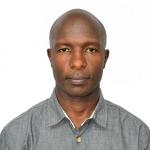
Student Short Biography:
Alfred Mutethia was born in Chugu location, Meru county on January 26, 1977. He attended school in the same location where he emerged top of the class. He proceeded to Kanyakine high school for his O levels. Though he didn’t make it straight to the university, he pursued a P1 certificate which opened up his doors to university education. He undertook his undergraduate in Bed/Arts majoring in Geography and Business Studies. With the thirst for education still rife and great appetite for Educational Technology, he pursued a Masters’ Degree in this field being in the premier class at the university of Nairobi.
Alfred is a deputy head teacher working with TSC, an Educational Technology trainer of trainers (TOT) and a facilitator in CBC training on educational technology matters in Abo-central division. Alfred is an upcoming researcher on Educational and information technologies.
Today, Alfred encourages young learners to embrace digital learning in order to arouse the 21st century skills which facilitates their achievement in academics and life dreams.
Project Summary
Project Title: EFFECT OF FLIPPED LEARNING FACETS ON PRIMARY SCHOOL PUPILS’ ACADEMIC ACHIEVEMENT IN SCIENCE IN ABOTHUGUCHI CENTRAL DIVISION, MERU COUNTY
Flipped learning is a learner-centred instructional approach whereby pupils are pre-deposed to new materials and content outside of the classroom and apply them in the next classroom meeting with the teacher playing the role of a facilitator. The pupils are expected to do their research at home and while in the classroom, actively engage in brainstorming, collaborating and reflecting on the concepts with guidance of the teacher. The primary aim of flipped learning is to increase pupils’ achievement through enhancements to homework, to bolster the attitudes surrounding homework, to increase the proportion of pupils submitting quality homework and to foster independent learning. The purpose of this study was to establish the effect of flipped learning facets on class seven pupils’ academic in science in Abothuguchi Central Division, Meru County. The study sought to address the following objectives; establish whether there is a significant difference in the science subject mean scores of pupils taught using educational videos and traditional methods; examine whether there is a significant difference in the science subject mean scores of pupils taught using out-of-class text reading and traditional methods; evaluate whether there is a significant difference in the science subject mean scores of pupils taught using video and out-of-class text reading and traditional methods; determine whether there is a significant difference in the science subject mean scores of pupils taught using blended learning and traditional methods. The objectives were formulated into four hypotheses. The sample consisted of 4 teachers, 4 head teachers and 103 class seven pupils from the 4 primary schools sampled for the study. The instruments used to collect data were: questionnaires for science teachers and pupils, interviews for the head teachers, observation schedule and pre and post achievement test. The objectives were analysed via inferential and descriptive statistics and presented via frequencies and percentages while the hypotheses were analysed through use of a computer program, SPSS version 23 and Microsoft Excel 2010. An independent-samples t-test was conducted to determine whether there was a statistically significant difference between the means in the control and the experimental groups. It is expected that the outcome of the study will be beneficial to both stakeholders and policy makers in matters of education. One of the key findings of the study was that flipped learning improved academic achievement in science. The key recommendation of the study is that the Government through the Ministry of Finance and Ministry of Education should allocate adequate funds for acquisition of IT resources in school.
